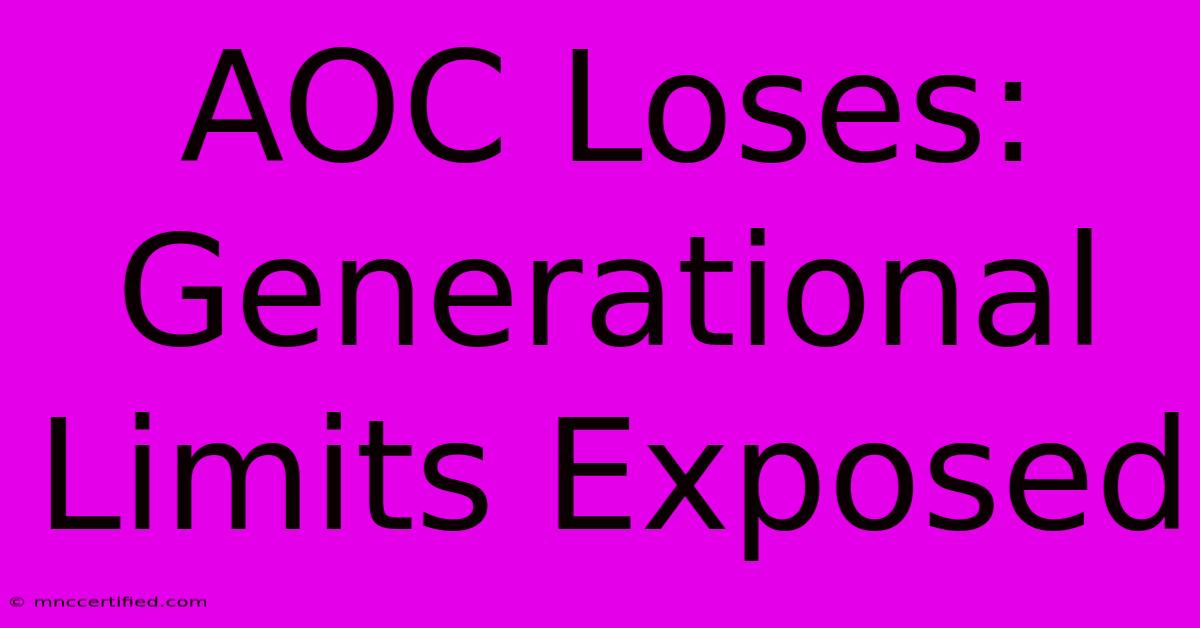AOC Loses: Generational Limits Exposed

Table of Contents
AOC Loses: Generational Limits Exposed
Alexandria Ocasio-Cortez (AOC), the rising star of the Democratic Party, has faced several setbacks recently, sparking a crucial conversation about the limitations of generational politics and the complexities of progressive movements. While her youthful energy and outspoken advocacy captivated a generation, her recent struggles highlight the challenges inherent in translating online activism into tangible political results. This article delves into the reasons behind AOC's recent losses, examining the limitations of her approach and the broader implications for progressive politics.
The Rise and Fall (So Far) of a Progressive Icon
AOC's meteoric rise was undeniably impressive. Her 2018 victory over a long-serving incumbent, fueled by grassroots support and a powerful online presence, symbolized a wave of progressive energy. She quickly became a prominent voice for the Democratic Party's left wing, advocating for policies like the Green New Deal and Medicare for All. Her social media savvy and ability to connect with younger voters were unprecedented. But recent setbacks paint a more nuanced picture.
Key Legislative Setbacks and Their Significance
While AOC has successfully championed some initiatives, key legislative goals have stalled. This isn't solely her fault; navigating the complexities of Congress requires compromise and coalition-building—skills that take time to master. The failure to pass ambitious climate legislation, for example, highlights the limitations of a progressive agenda in a politically divided nation. This points to a critical need for strategic political maneuvering, beyond simply rallying online support.
The impact of these legislative setbacks extends beyond specific policy failures. They raise questions about the efficacy of AOC's political strategy, particularly its reliance on virality and online activism. While social media is a potent tool, it doesn't automatically translate into legislative victories. This disconnect underscores a crucial lesson: online engagement needs to be complemented by effective ground-level organizing and strategic alliances within the political system.
Generational Divide and Political Pragmatism
AOC's struggles expose a generational gap within the Democratic Party. While her message resonates with younger voters, it faces resistance from more moderate Democrats and Republicans. This highlights the challenge of bridging generational divides and finding common ground on complex issues. The pursuit of purely idealistic policies without considering political feasibility can ultimately hinder progress. Pragmatism and coalition-building, often perceived as compromises by some, are essential for achieving real-world change.
The Importance of Building Broad Coalitions
AOC's future success hinges on her ability to build broader coalitions. This requires moving beyond solely appealing to her core base and engaging in constructive dialogue with those who hold differing views. Focusing on shared goals and finding common ground—even on seemingly intractable issues—is crucial for achieving meaningful political change. Effective political leadership requires both passion and pragmatism.
The Future of Progressive Politics: Lessons Learned
AOC's recent challenges offer valuable lessons for progressive movements. While online activism is vital for raising awareness and mobilizing support, it's only one piece of the puzzle. Effective political change requires a multifaceted approach, incorporating:
- Strategic Political Alliances: Building bridges with moderate Democrats and even some Republicans is essential for legislative success.
- Grassroots Organizing: Complementing online activism with on-the-ground organizing strengthens the movement's reach and impact.
- Pragmatic Policy-Making: Balancing idealistic goals with political realities is crucial for achieving tangible results.
- Long-Term Vision: Progressive change is rarely instantaneous; a long-term strategy is necessary for sustained impact.
AOC's political journey is far from over. Her ability to adapt, learn, and build broader coalitions will ultimately determine her lasting influence on American politics. The challenges she faces aren't unique; they represent the hurdles all progressive movements confront in a complex and deeply divided political landscape. The lessons learned from her experiences will be vital for future generations of progressive leaders.

Thank you for visiting our website wich cover about AOC Loses: Generational Limits Exposed. We hope the information provided has been useful to you. Feel free to contact us if you have any questions or need further assistance. See you next time and dont miss to bookmark.
Featured Posts
-
14 Killed Hundreds Hurt In Vanuatu
Dec 18, 2024
-
Juventus Targets Versatile Players
Dec 18, 2024
-
Nba Prize Picks Player Props Tuesday 12 17
Dec 18, 2024
-
Pakistan Wins Ayub And Aghas Heroics
Dec 18, 2024
-
Husains Bbc Today Farewell Speech
Dec 18, 2024